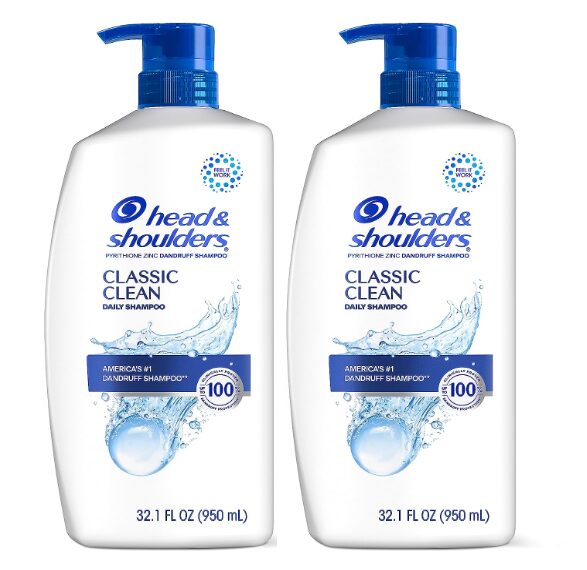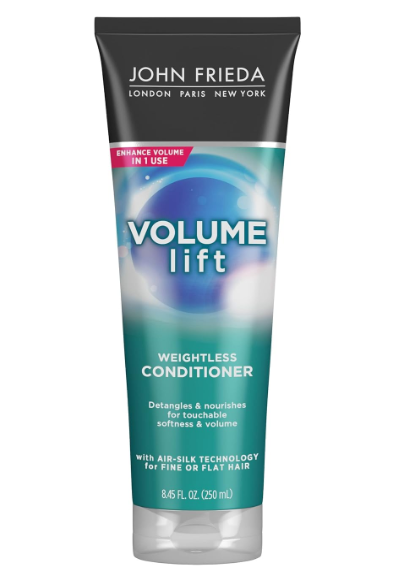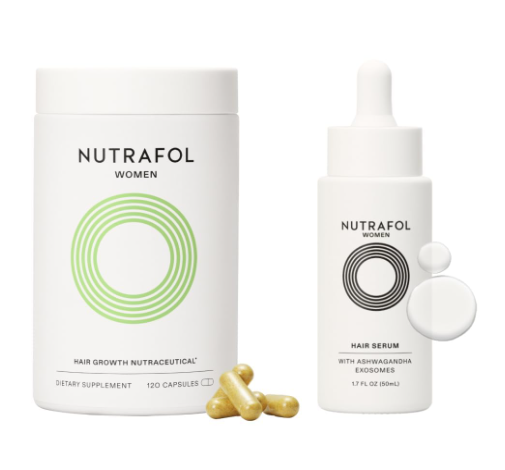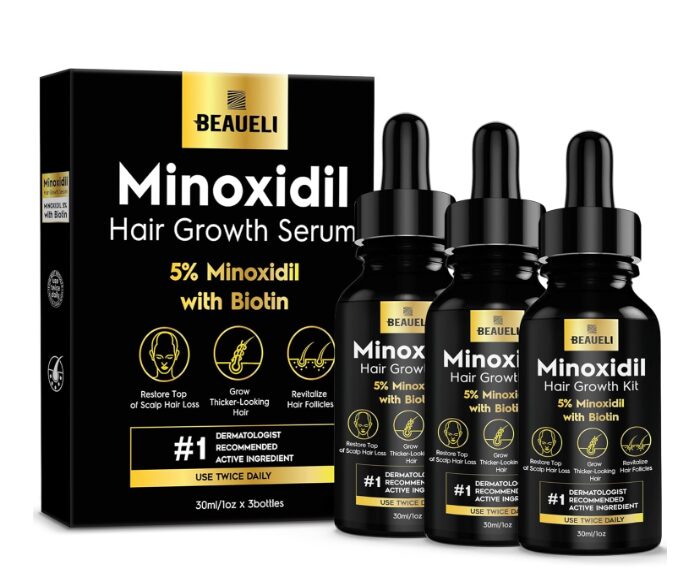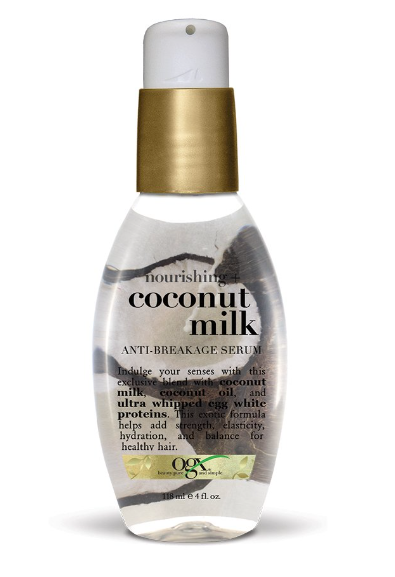Nourish Your Locks Back to Health After Child Birth
Hair Care for Postpartum Women. Experiencing postpartum hair loss can be distressing, but rest assured, you’re not alone. Many women go through this temporary phase after giving birth. The hormonal changes that occur during and after pregnancy can cause hair thinning and shedding. However, there are various hair care tips and products available to help manage postpartum hair loss and promote healthy hair regrowth.
Key Points – Hair Care for Postpartum Women:
- Postpartum hair loss is a common occurrence due to hormonal changes after childbirth.
- Managing postpartum hair loss involves adopting a comprehensive hair care routine.
- Recommended products include shampoos for hair loss, supplements for hair growth, topical treatments, nourishing serums, and hair masks.
- Taking care of your scalp and practicing self-care can also contribute to healthier hair regrowth.
- Embracing your postpartum hair journey with confidence is an important part of self-care as a new mom.
Understanding Postpartum Hair Loss
Hair Care for Postpartum Women explained. Postpartum hair loss is a common concern for many women after pregnancy. It occurs due to hormonal fluctuations that occur as a result of childbirth. During pregnancy, hormone levels increase, leading to decreased hair shedding and thicker hair. However, after giving birth, hormone levels drop, causing the extra hair that was retained during pregnancy to shed.
This process of postpartum hair loss typically peaks around 3-6 months postpartum. It is a natural phenomenon that affects many new mothers. Factors such as stress and lack of sleep can further exacerbate the hair loss.
It’s important to remember that postpartum hair loss is temporary and usually resolves on its own within a year. Understanding the causes and knowing that it is a normal part of the postpartum experience can help alleviate any concerns or anxieties.
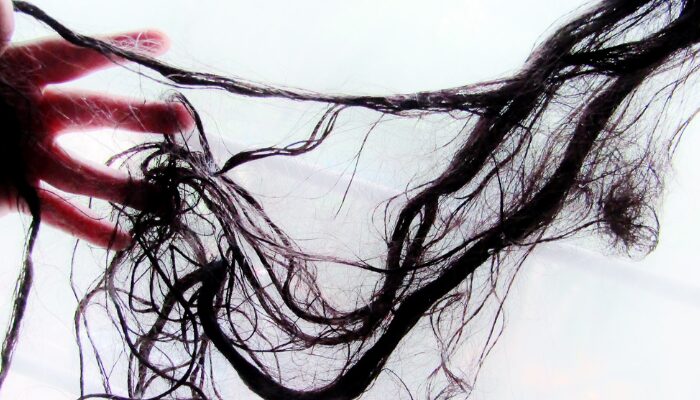
Although postpartum hair loss cannot be completely prevented, there are steps you can take to care for your hair during this period. From using gentle hair care products to adopting a healthy lifestyle, various approaches can help promote hair health and regrowth.
Best Shampoo for Postpartum Hair Loss
Shampoo Hair Care for Postpartum Women. When it comes to managing postpartum hair loss, finding the right shampoo can make a significant difference in promoting hair regrowth and maintaining healthy locks. One highly recommended option is Head & Shoulders Classic Clean Daily Shampoo.
This popular shampoo contains pyrithione zinc, a powerful ingredient known for its anti-inflammatory properties. By reducing scalp inflammation, this shampoo helps create an optimal environment for healthier hair growth. It gently cleanses the scalp, removing excess oil and product buildup, without stripping the hair of its natural oils.
Additionally, Head & Shoulders Classic Clean Daily Shampoo is effective in alleviating itchiness and nourishing the scalp. Its pH-balanced formula is gentle enough for daily use, providing relief and hydration for postpartum hair.
Another shampoo that can be beneficial for postpartum hair loss is John Frieda Volume Lift Weightless Conditioner. This shampoo focuses on promoting volume and thickness, adding body and fullness to thinning hair. Its lightweight formula helps prevent further hair breakage and leaves your strands feeling revitalized.
View Volume Lift Conditioner On Amazon
| Shampoo | Key Benefits |
|---|---|
| Head & Shoulders Classic Clean Daily Shampoo |
|
| John Frieda Volume Lift Weightless Conditioner |
|
By incorporating these top-performing shampoos into your hair care routine, you can effectively combat postpartum hair loss and embrace strong, voluminous hair once again.
Supplements – Hair Care for Postpartum Women
You want to nourish your hair and promote growth after experiencing postpartum hair loss. That’s where supplements can be helpful. Two recommended options are Viviscal Hair Growth Supplement and Nutrafol Postpartum. These supplements are specifically formulated to address the root causes of postpartum hair thinning, including nutrient depletion and hormonal fluctuations.
Viviscal Hair Growth Supplement:
This supplement is a powerful blend of vitamins, minerals, and a marine complex that has shown impressive results in reducing hair loss and promoting thickness. By providing essential nutrients to your hair follicles, Viviscal can help restore vitality to your hair and support healthy growth. It’s a trusted choice for many postpartum women looking to enhance their hair health.
Nutrafol Postpartum:
Formulated with a plant-based blend of ingredients, Nutrafol Postpartum targets the underlying causes of postpartum hair thinning. This supplement addresses nutrient depletion and hormonal imbalances that contribute to hair loss. By supporting your body’s natural processes, Nutrafol Postpartum promotes hair growth from within, helping you achieve thicker, healthier hair.
When choosing a supplement, it’s important to consider your specific needs and consult with your healthcare professional. They can provide personalized advice based on your individual circumstances, including if you are breastfeeding. With the right supplements and their nourishing benefits, you can support your postpartum hair journey and regain your full, vibrant locks.
Topical Treatments for Postpartum Hair Loss
If you’re experiencing postpartum hair loss, there are topical treatments available that can help promote hair regrowth and combat thinning hair. One highly recommended option is Rogaine 2% or 5% Minoxidil Topical Treatment For Women, an FDA-approved treatment specifically designed for postpartum hair loss.
Minoxidil for postpartum hair loss:
Minoxidil is a key ingredient in Women’s Rogaine that has been proven effective in stimulating hair growth. It works by increasing the duration of the hair growth phase and gradually enlarging miniaturized hair follicles. This process leads to thicker and more voluminous hair over time.
Consultation with a healthcare professional:
As with any treatment, it is important to consult with a healthcare professional before using minoxidil, especially if you are breastfeeding. They can provide personalized advice and guidance based on your specific situation.
By incorporating topical solutions, such as Women’s Rogaine 5% Minoxidil Topical Aerosol, into your postpartum hair care routine, you can effectively address hair thinning and promote healthier, fuller-looking hair.
Nourishing Serums for Postpartum Hair
After pregnancy, it’s common for women to experience thinning hair and breakage. To address these concerns and promote healthy hair growth, incorporating a nourishing serum into your postpartum hair care routine can make a significant difference.
One popular choice is the OGX Nourishing Coconut Milk Anti-Breakage Serum. This postpartum hair serum is specifically designed to prevent breakage and restore hydration to your hair. It is enriched with nourishing ingredients like coconut oil, which strengthens the hair and improves its overall health and appearance.
The OGX Nourishing Coconut Milk Anti-Breakage Serum provides deep hydration to your hair, locking in moisture and protecting it from damage. Regular use of this serum can help revive your postpartum hair, making it stronger, healthier, and more resilient to breakage.
| Benefits of OGX Nourishing Coconut Milk Anti-Breakage Serum |
|---|
| – Prevents breakage |
| – Restores hydration to postpartum hair |
| – Strengthens the hair |
| – Improves overall hair health and appearance |
Using hair serums like the OGX Nourishing Coconut Milk Anti-Breakage Serum is a great way to moisturize and protect your hair while promoting healthy hair growth. Remember to apply the serum according to the product instructions and gently massage it into your scalp and hair for optimal results.
By incorporating a nourishing serum into your post-baby hair care routine, you can nourish and revitalize your hair, helping it regain its pre-pregnancy luster. Say goodbye to postpartum hair concerns and hello to healthy, beautiful locks!
Hair Mask Treatment for Postpartum Hair
Nourishing your postpartum hair is essential for promoting its health and minimizing thinning. One highly regarded hair mask treatment that can help strengthen and repair your hair is the Olaplex Hair Perfector No. 3. This concentrated treatment is applied before shampooing and conditioning your hair, and it works by rebuilding the hair bonds, resulting in smoother and healthier-looking locks.
The Olaplex Hair Perfector No. 3 is formulated without parabens, making it a clean and safe option for postpartum hair care. However, it does contain sulfates, so if you prefer sulfate-free products, you may want to explore other options.
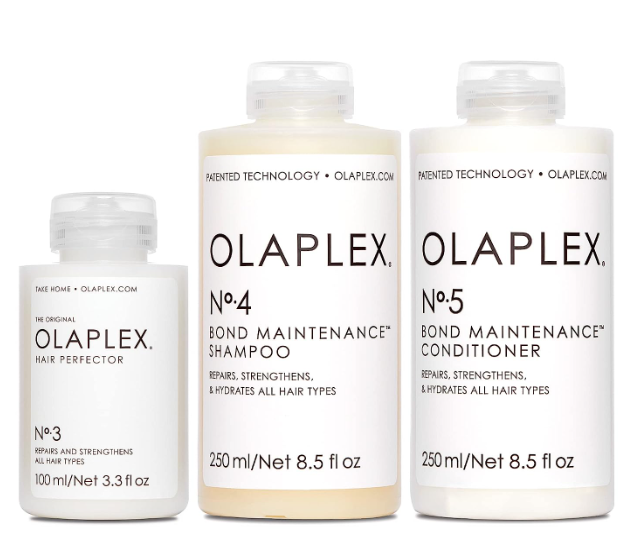
Tips for Dealing with Postpartum Hair Loss
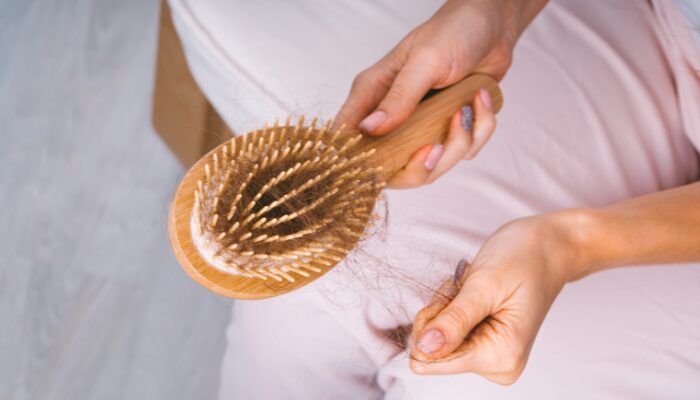
Hair Care for Postpartum Women – Managing postpartum hair loss can be a challenge, but there are steps you can take to minimize its impact. By following these tips, you can cope with thinning hair after childbirth and regain confidence in your hair’s appearance.
1. Nourish Your Hair from Within
Start by ensuring you have a healthy and balanced diet that includes essential nutrients for hair growth. Incorporate foods rich in vitamins and minerals, such as fruits, vegetables, lean proteins, and whole grains. Additionally, consider taking prenatal vitamins or supplements specifically designed to support postpartum hair health.
2. Handle Your Hair with Care
Be gentle when washing and styling your hair. Limit shampooing to two or three times a week to prevent excessive drying and breakage. Use a wide-toothed comb or a brush with soft bristles to avoid tugging and pulling on delicate strands. Avoid heat styling tools, such as flat irons and curling wands, as they can further damage fragile postpartum hair.
3. Postpone Chemical Hair Treatments
Postpone chemically based hair treatments, such as coloring, perming, or relaxing, until your hair has fully recovered. These treatments can weaken already fragile hair and worsen the issue of hair loss. Instead, embrace natural hair styles or try temporary alternatives, like clip-in extensions, to add volume without causing further damage.
4. Seek Professional Advice
Hair Care for Postpartum Women – Medical Advise. If you’re experiencing excessive hair loss or if hair loss is accompanied by other concerning symptoms, it’s important to consult with a medical professional. They can help identify any underlying issues and provide guidance on appropriate treatments or lifestyle adjustments to promote hair regrowth.
Remember, postpartum hair loss is a temporary phase, and with patience and the right care, your hair will gradually return to its pre-pregnancy state. In the meantime, focus on nurturing your hair and maintaining a positive mindset. You are not alone in this journey, and there are many resources and support available to help you navigate postpartum hair loss.
The Mom Cut: A Stylish Solution for Postpartum Hair
Hair Care for Postpartum Women – Embracing a new look. One way to address postpartum hair loss and create the illusion of more volume is by getting a fresh haircut. A shorter hairstyle can help hide thinning hair and create a fuller appearance. The “mom cut” doesn’t have to be dull or unflattering; it can be a chance to embrace a new look and feel confident during your postpartum journey.
Pre-Shower Detangling for Minimizing Postpartum Hair Loss
Detangling your hair before showering is an essential step in managing postpartum hair loss. By gently brushing or combing through dry hair, you can remove tangles and knots, reducing the strain on your hair follicles and minimizing hair loss during the shower. Taking this extra bit of time to detangle can make a significant difference in managing postpartum hair loss effectively.
| Hair Care for Postpartum Women – Tips for Pre-Shower Detangling: |
|---|
| 1. Use a wide-toothed comb: Choose a wide-toothed comb instead of a brush to minimize breakage and preserve the health of your hair. |
| 2. Start from the ends: Begin detangling from the ends of your hair and work your way up to the roots to avoid unnecessary pulling and hair damage. |
| 3. Divide and conquer: If your hair is particularly thick or tangled, divide it into smaller sections and detangle each section separately for more manageable and effective detangling. |
| 4. Be gentle: Patience is key when detangling postpartum hair. Use slow and gentle motions to avoid excessive hair shedding. |
| 5. Apply a detangling spray: If your hair is prone to tangles, you can use a detangling spray or conditioner to help ease the process of detangling and protect your hair from breakage. |
By incorporating pre-shower detangling into your hair care routine, you can significantly minimize postpartum hair loss and promote healthier, more resilient hair.
Scalp Care Routine for Promoting Hair Regrowth Postpartum
Hair Care for Postpartum Women – Scalp Routine Guide. Establishing a scalp care routine can be key in supporting healthy hair regrowth after childbirth. By incorporating regular scalp massages into your routine, you can promote increased blood flow to the hair follicles, stimulating hair growth.
Additionally, using nourishing scalp oils or serums infused with natural DHT blockers like Stinging Nettle or Saw Palmetto can help combat hair loss and support the regrowth of new, healthy hair. These natural ingredients can help balance hormone levels in the scalp and create a conducive environment for hair growth.
Pairing your scalp care routine with a sulfate-free scalp wash is essential. This type of cleanser effectively removes dirt, excess oil, and product build-up without stripping away the natural moisture and oils that are beneficial for hair growth. It helps to invigorate the scalp and create a clean and healthy environment for new hair to thrive.
Embracing Your Postpartum Hair Journey with Confidence
Postpartum hair loss is a temporary phase that many women experience after giving birth. It’s important to understand that this is a natural process caused by hormonal changes and will resolve over time. While it can be challenging to see your hair thinning or shedding, there are proactive steps you can take to manage and promote hair regrowth.
Self-care for your post-baby hair starts with using specialized products that nourish and stimulate hair follicles. Look for shampoos and conditioners specifically designed to strengthen and volumize thinning hair. Consider incorporating supplements into your routine, like the well-known Viviscal Hair Growth Supplement or Nutrafol Postpartum, to support hair health from the inside out.
Adopting a scalp care routine can also make a difference. Regular scalp massages increase blood flow to the hair follicles, promoting hair growth. Explore serums and oils infused with natural DHT blockers like Stinging Nettle or Saw Palmetto to combat hair loss. Shampooing with sulfate-free products can further cleanse and invigorate the scalp.
Finally, don’t be afraid to try new hairstyles that embrace your postpartum hair changes. Experiment with shorter cuts or styles that add volume and create the illusion of fuller hair. Remember, your hair will eventually return to its pre-pregnancy state, and in the meantime, nourish it with care and patience. Embrace your postpartum hair journey with confidence, knowing that you are taking proactive steps towards healthier, more vibrant hair.
FAQ Hair Care for Postpartum Women
What causes postpartum hair loss?
Hair Care for Postpartum Women Reasons. Postpartum hair loss occurs due to hormonal fluctuations after childbirth. During pregnancy, elevated hormone levels result in decreased hair shedding, leading to thicker hair. However, after giving birth, hormone levels drop, and the extra hair that was retained begins to shed. This process usually peaks around 3-6 months postpartum and can be exacerbated by factors such as stress and lack of sleep.
What is a recommended shampoo for postpartum hair loss?
Head & Shoulders Classic Clean Daily Shampoo is a popular choice for managing postpartum hair loss. It contains pyrithione zinc, which has anti-inflammatory properties that reduce scalp inflammation and may support healthier hair growth. Other shampoos that can be beneficial include those that promote volume and thickness, such as John Frieda Volume Lift Weightless Conditioner.
What are some supplements for promoting hair growth after pregnancy?
Viviscal Hair Growth Supplement and Nutrafol Postpartum are two recommended supplements for promoting hair growth after pregnancy. Viviscal is a combination of vitamins, minerals, and a marine complex that has shown impressive results in reducing hair loss and promoting thickness. Nutrafol Postpartum is a plant-based supplement formulated to address the root causes of postpartum hair thinning, including nutrient depletion and hormonal fluctuations.
Are there any topical treatments for postpartum hair loss?
Women’s Rogaine 5% Minoxidil Topical Aerosol is an FDA-approved treatment that can be effective for postpartum hair loss. It works by increasing the duration of the hair growth phase and gradually enlarging miniaturized hair follicles to produce thicker hair. It is important to consult with a healthcare professional before using minoxidil while breastfeeding.
What are some nourishing serums for postpartum hair?
OGX Nourishing Coconut Milk Anti-Breakage Serum is a hair serum that can help prevent breakage and restore hydration to postpartum hair. It contains nourishing ingredients like coconut oil, which strengthens the hair and improves its overall health and appearance. Hair serums like this one can moisturize and protect the hair, promoting healthy hair growth.
Is there a hair mask treatment for postpartum hair?
Olaplex Hair Perfector No. 3 is a highly regarded hair mask treatment that can help strengthen and repair postpartum hair. It is a concentrated treatment applied before shampooing and conditioning the hair, and it works by rebuilding the hair bonds, resulting in smoother and healthier-looking hair. It is formulated without parabens but does contain sulfates.
What are some tips for dealing with postpartum hair loss?
Some tips for managing postpartum hair loss include getting the right nutrients through a healthy diet and prenatal vitamin supplementation, being gentle with your hair by minimizing shampooing and using a wide-toothed comb, avoiding heat styling tools, postponing chemically based hair treatments, and seeking medical advice if hair loss is excessive or accompanied by other symptoms.
Can a new haircut help with postpartum hair loss?
Yes, getting a fresh haircut can help address postpartum hair loss and create the illusion of more volume. A shorter hairstyle can help hide thinning hair and create a fuller appearance. The “mom cut” doesn’t have to be dull or unflattering; it can be a chance to embrace a new look and feel confident during your postpartum journey.
How can I minimize hair loss while showering?
Detangling your hair before showering can help minimize the amount of hair that sheds during the washing process. Gently brush or comb through dry hair to remove tangles and knots. This can reduce the strain on your hair follicles and minimize hair loss while showering. Taking this extra step can help you manage postpartum hair loss more effectively.
Are there any scalp care routines for promoting hair regrowth postpartum?
Establishing a scalp care routine can support healthy hair regrowth. Regular scalp massages promote blood flow to the hair follicles, stimulating hair growth. Using nourishing scalp oils or serums infused with natural DHT blockers like Stinging Nettle or Saw Palmetto can also help combat hair loss and support hair regrowth. Pairing scalp care with a sulfate-free scalp wash can further cleanse and invigorate the scalp.
Is postpartum hair loss permanent?
No, postpartum hair loss is a temporary phase that many women experience after giving birth. By understanding the causes and available treatments, you can take proactive steps to manage and promote hair regrowth. Whether it’s through using specialized products, adopting a scalp care routine, or exploring new hairstyles, embracing your postpartum hair journey with confidence is an important part of self-care as a new mom. Remember, your hair will eventually return to its pre-pregnancy state, and in the meantime, nourish it with care and patience.
Click to read our Hair and Hormones Article
Hair Care for Postpartum Women Table of Contents


